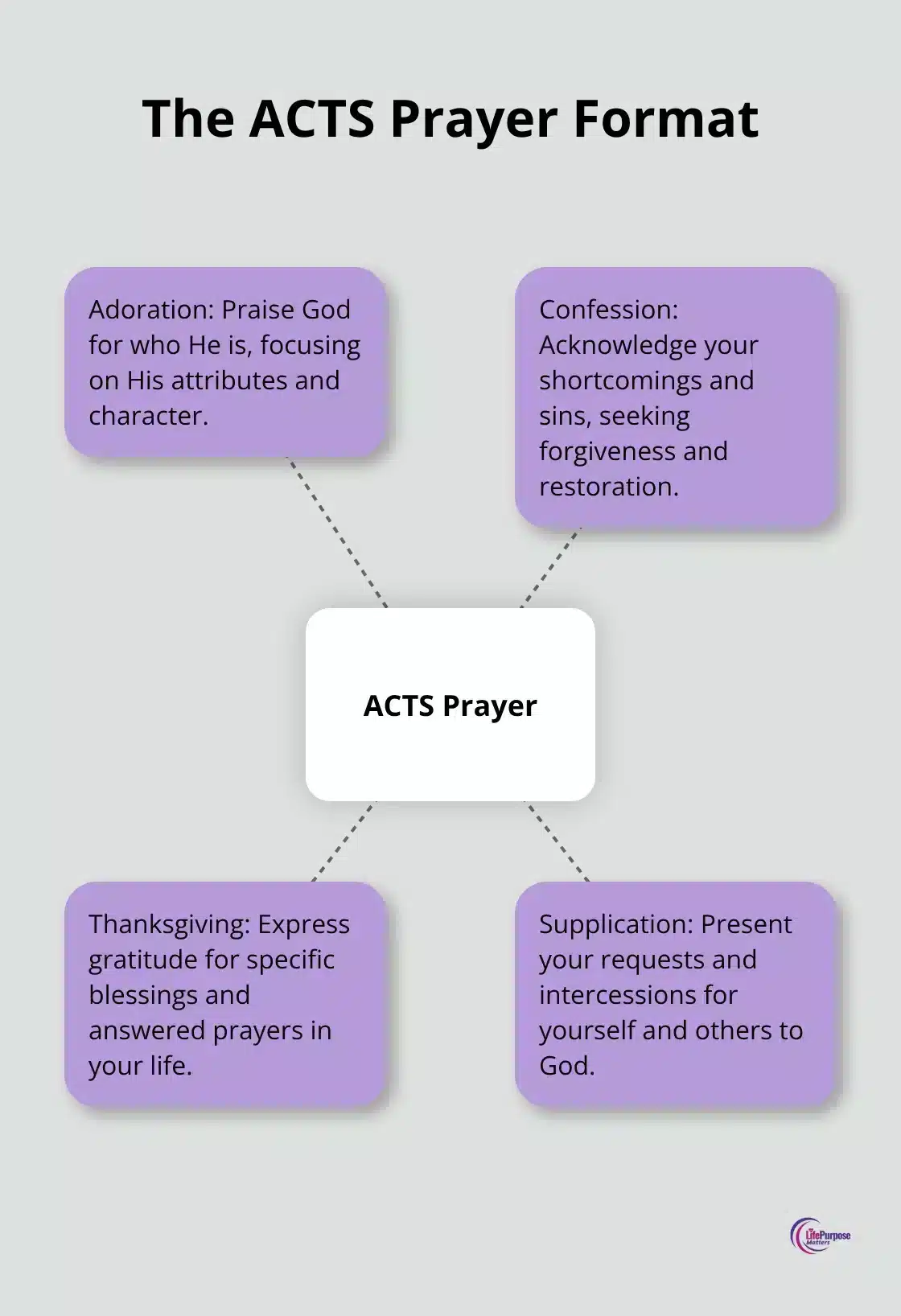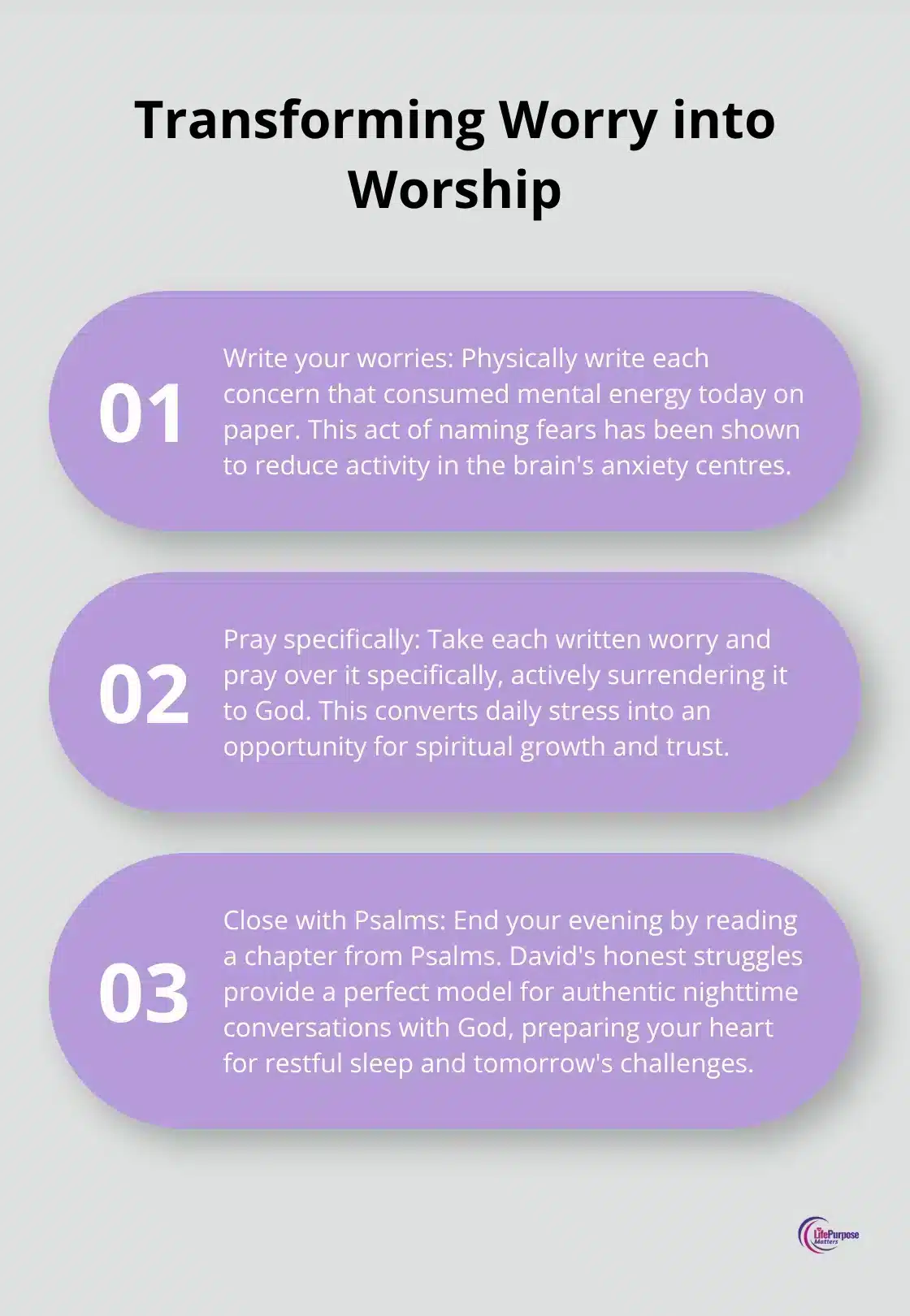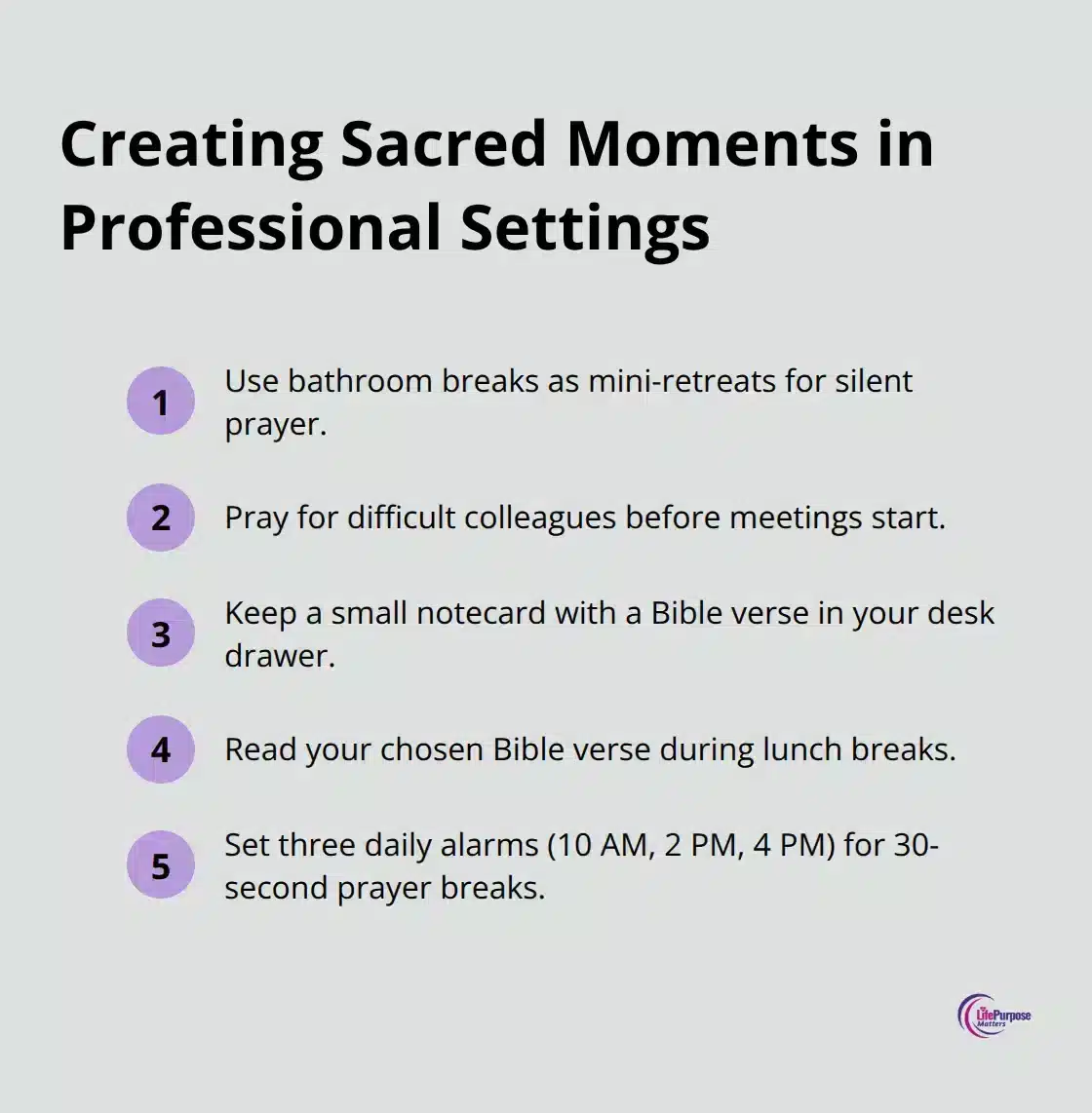If you’re anything like me, you’ve probably wondered how to make your faith feel more alive in the middle of hectic schedules and endless to-do lists. The truth is, building daily spiritual habits doesn’t require hours of your time. To deepen your walk with God, practice daily spiritual habits such as prayer, Bible study, and meditation on His Word. Other habits include practising gratitude, serving others, listening to worship music, maintaining a godly community, journaling, fasting, and setting spiritual boundaries. These disciplines cultivate dependence on God and help you grow in obedience and faith.
Table of Contents
ToggleHere at Life Purpose Matters, we believe that small, consistent practices can transform your relationship with God. Just 10-15 minutes each morning and evening can create profound spiritual growth that carries you through even the busiest days.
How Should You Start Your Morning with God?
Your morning sets the spiritual tone for your entire day, and the first 15 minutes after you wake up hold the most power. Research from Harvard demonstrates that changes in brain structure occur through mindfulness practices, which makes this the optimal time for focused prayer and meditation. Start with a two-minute gratitude prayer before you check your phone – this single habit rewires your brain to seek God first rather than worldly distractions.
Transform Your Bible Study into an Active Conversation
Skip the random Bible verse approach that leaves you spiritually hungry. Instead, use the SOAP method: Scripture, Observation, Application, Prayer. Read one chapter from Proverbs daily – it contains 31 chapters, perfect for monthly cycles. Write down one specific insight and ask God how to apply it within the next 24 hours. The key lies in how you treat Bible study as a dialogue, not a monologue.
Design Your Sacred Morning Space
Your environment shapes your spiritual focus more than you realise. Create a dedicated prayer corner with three essentials: a comfortable chair, good lighting, and zero digital distractions. Keep your Bible, journal, and a simple cross visible. Neuroscience research indicates that consistent physical locations trigger mental associations – your brain will automatically shift into prayer mode when you sit in your designated space (this isn’t about perfection; it’s about intentionality).
Build Your Morning Prayer Rhythm
Start with just five minutes of structured prayer time. Use the ACTS format: Adoration (praise God for who He is), Confession (acknowledge your shortcomings), Thanksgiving (express gratitude for specific blessings), and Supplication (present your requests). This framework prevents your prayers from becoming repetitive wish lists and transforms them into meaningful conversations with your Creator.

Once you establish these morning practices, you’ll notice how they naturally prepare your heart for the day ahead. But what happens when evening comes and you need to process everything that occurred?
How Do You End Your Day in God’s Presence
Your evening routine determines how well you sleep and how prepared your heart feels for tomorrow. Studies show that people who practice gratitude before bed experience better sleep quality and wake up more optimistic. Start your evening reflection exactly 30 minutes before your planned bedtime – this gives your mind enough time to process the day without rushing.
Practice Specific Gratitude That Transforms Your Heart
Write down three specific things God provided today, but go deeper than surface gratitude. Instead of writing “I’m grateful for my family,” write “I’m grateful Dad called exactly when I needed encouragement about my work situation.” This specificity trains your brain to notice God’s detailed care throughout each day. Research shows that detailed gratitude practices create stronger neural pathways than generic thankfulness. To help you get started, check out our 30-Day Gratitude and Contentment Journal
Process Your Heart Before Sleep
Skip the generic bedtime prayers that sound the same every night. Instead, ask yourself two targeted questions: Where did I resist God’s leading today, and where did I see His faithfulness? Write honest answers in a dedicated evening journal – expressive writing reduces stress hormones and helps process emotions effectively.
Confess specific struggles to God rather than offering vague apologies. Then consciously release each worry, speaking it aloud and declaring your trust in God’s sovereignty. End with Psalm 4:8 as your sleep declaration, letting Scripture anchor your subconscious mind in peace rather than anxiety.
Transform Worry into Worship
Your evening reflection becomes powerful when you convert daily stress into active surrender. Take each worry that consumed mental energy today and physically write it on paper, then pray specifically over that concern. Neuroscience research indicates that naming fears reduces activity in the brain’s anxiety centres.

Close your evening with one chapter from Psalms – David’s honest struggles with God provide the perfect model for authentic nighttime conversations with your Creator. This practice prepares your heart not just for restful sleep, but for the spiritual challenges that await during your busiest daytime hours. When facing particularly tough times, these evening conversations with God become even more essential for maintaining spiritual strength.
How Can You Stay Connected to God During Hectic Workdays
Your busiest workdays offer the greatest opportunities for spiritual growth, but only if you prepare strategically. Research shows that smartphones can be significant distractions during work, which means you need intentional strategies to redirect those interruptions toward spiritual connection. Set three specific phone alarms at 10 AM, 2 PM, and 4 PM for 30-second prayer breaks – these strategic interruptions retrain your brain to seek God during peak stress periods rather than default to worry.
Turn Commute Time into Scripture Memory Sessions
Your daily commute wastes precious spiritual development time unless you convert it into active Scripture memorisation. Choose one verse each week and repeat it during every car ride, walk, or public transit journey. Start with Philippians 4:13 and progress through verses that address your current struggles. Studies demonstrate that verbal repetition creates stronger memory retention than silent reading, so speak verses aloud even if you feel awkward initially. Download audio Bible apps like YouVersion and play the same chapter repeatedly during your commute – this passive absorption method helps Scripture become your default mental soundtrack.
Transform Routine Tasks into Worship Opportunities
Stop treating dishwashing, laundry folding, and grocery shopping as spiritual dead zones. These repetitive activities create perfect conditions for contemplative prayer because your hands stay busy while your mind remains free to connect with God. Pray the Lord’s Prayer slowly during household chores, spending 30 seconds on each phrase while your body completes familiar tasks. Research indicates that routine physical activities reduce stress levels and increase focus, making ordinary moments ideal for spiritual reflection. Thank God specifically for each item you wash, each piece of clothing you fold, each food item you purchase – this detailed gratitude practice turns mundane tasks into active worship.
Create Sacred Moments in Professional Settings
Your workplace provides unexpected opportunities for quiet spiritual connection when you know where to look. Use bathroom breaks as mini-retreats for silent prayer (nobody questions a two-minute bathroom visit). Pray for difficult colleagues before meetings start, which shifts your heart from frustration to compassion. Keep a small notecard with a Bible verse in your desk drawer and read it during lunch breaks. These micro-moments of faith connection accumulate throughout your day and create a foundation of peace that sustains you through workplace stress and challenging interactions with others.

Final Thoughts
Daily spiritual habits require patience with yourself and realistic expectations. Start with just one morning practice and one evening ritual for two weeks before you add anything else. Research shows that 66 days creates lasting behavioural change, so commit to small steps rather than dramatic overhauls that lead to burnout.
The biggest obstacle isn’t time – it’s perfectionism. You’ll miss days, feel distracted during prayer, and struggle with consistency. These setbacks don’t disqualify you from spiritual growth; they’re part of the process (when you skip a day, simply restart the next morning without guilt or lengthy catch-up sessions).
Your next step involves choosing one specific habit from this guide and implementing it tomorrow morning. Whether it’s five minutes of gratitude prayer or reading one Proverbs chapter, consistency matters more than duration. At Life Purpose Matters, we believe that these daily spiritual habits become the foundation for recognising God’s calling on your life and living it out with confidence and joy.

